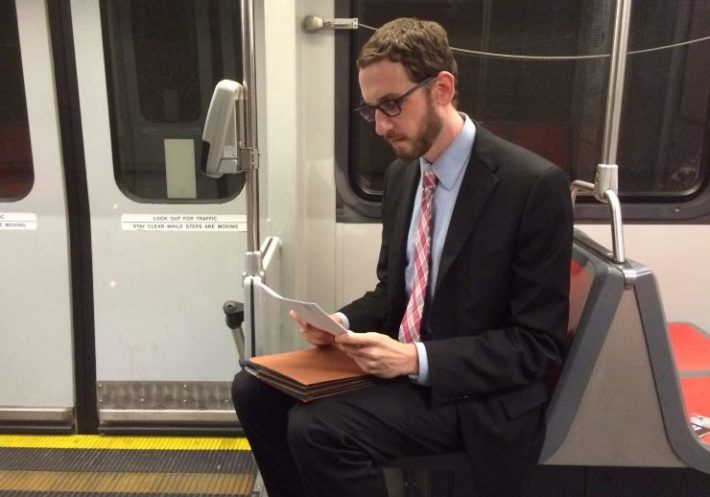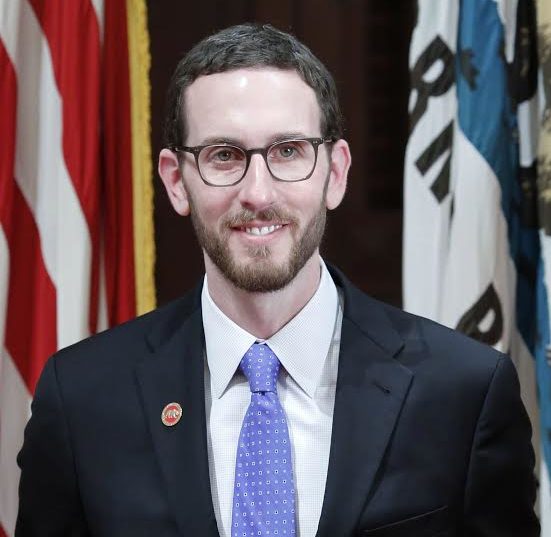Senator Scott Wiener is one of the newly elected members of the California legislature, replacing termed-out Senator Mark Leno to represent San Francisco. Formerly a San Francisco County Supervisor, he comes to the Senate with a strong interest in transportation and housing, among other issues. He has been appointed to the Senate Transportation and Housing Committee, which is chaired by Senator Jim Beall, as well as committees on energy, utilities and communications and public safety. The freshman Senator also has been assigned to chair the Human Services Committee and to serve on the Appropriations Committee, which oversees budget allocations.
Streetsblog sat down with him a few weeks ago to find out where he stands on SBCA issues.
We spoke first about transportation funding. Senator Wiener made it clear that he recognizes the importance of investing in public transit as well as maintaining the rest of the transportation system.
“We need a significant increase in transportation investment in California, period,” he said. “For transit, for roads, for bike, pedestrian—everything. But specifically we have to make sure we're supporting transit.”
“All too frequently in Sacramento, once transportation funding moves forward it's overwhelmingly for roads, with very little for public transportation.” That needs to change, he said. Transit “shouldn't have to beg” for funds to operate.
Cap-and-trade funds were an opportunity to shift the funding away from new roads and towards public transit, but it's just a first step. “We got quite a bit of money for public transportation [from cap-and-trade], in addition to the high-speed rail money,” he said. “That's a great step, but it's not enough.”
Senator Jim Beall's S.B. 1, which will likely be the foundation for conversations about transportation funding in this legislative session, has some money for transit, but focuses mostly on roads. The bill was originally introduced last year as part of the Transportation Special Session but ultimately went nowhere, and has been reintroduced for the current session. Senator Wiener says he is working with transportation committee chair Beall to make sure transit is not overlooked in funding bills as they go forward.
“We know the Bay Area's going to grow by two million people in the next 25 years. L.A. is growing; the state as a whole is growing. We can't just keep doing things in California the way we have done the last fifty years,” said Wiener.
“We can't have more and more cars on the road; the geometry does not work. It's miserable for everyone, including drivers. It's in everyone's interest to have a massive expansion of public transportation, in our urbanized areas in particular.”
“That's a priority.”
Not just at the state level, either. “We need to make it easier for local jurisdictions to generate transit funding as well,” he said. “That's also important; it's too hard right now.”

He also emphasized the importance of making sure that, as the state invests in improving roads, all users are considered. “I think the state has a roll to play in incentivizing communities to build complete streets,” he said. “We're going to increase the state investment in roads, which I support as long as it includes transit investment. As communities are resurfacing and rebuilding roads, it's really important to keep street safety and livability and complete streets in mind.” We don't want to rebuild streets “the way they were built in the '40s and '50s and '60s,” he says, ticking off another priority.
Another priority for the Senator—although not something that he plans to focus on right away—is revisiting the vehicle code, especially as it pertains to bikes. Wiener authored legislation in San Francisco to allow bicyclists to treat stop signs as “yield” signs, partly in response to a draconian crackdown by the SFPD, but the local regulation was ultimately vetoed by San Francisco Mayor Ed Lee.
Senator Wiener stopped short of saying he would introduce a similar bill at the statewide level. Instead, he said, he wants to meet first with statewide cycling advocates to hear what their priorities are. “But in the long run,” he said, “We do need to look at the vehicle code.”
“The vehicle code treats bikes exactly as if they were cars, and they're not cars, so we should be taking a look at that. We want more people biking,” he said. “Rules that make all the sense in the world for a massive heavy vehicle that can easily kill people—we don't necessarily need to apply them in a mindless way to bikes. A lot of those rules should apply to bikes—it makes sense for them to apply to bikes—but some of them we might need to take a look at.”
When asked about incorporating complete streets into the funding bill, Senator Wiener said he definitely wants to see that happen. As currently written, S.B. 1 includes a mild requirement for Caltrans to update its guidance on complete streets, but that's as far as it goes. The bill has little teeth to require paving or maintenance projects funded by it, for example, to improve conditions for people who walk or ride a bike. “If you conditioning funding on designing streets in a certain way, then it becomes stronger,” said Wiener.
But he also cautioned that the concept can be challenging “Sometimes it's a fight, even in San Francisco, for a lot of communities,” he said. “It's a big step to start redesigning streets that way, and if you try to go for the gusto in step one you're probably not going to get anywhere. So sometimes it takes those initial steps to move in the right direction.”
The Senator also has a big interest in housing, including affordable housing, and energy policies. He has already introduced two bills, S.B. 35 - to make it easier to build housing, and S.B. 71 - to encourage clean energy.
S.B. 35 is a direct response to Governor Jerry Brown's budget proposal and his call for legislation to fix housing policy. “There were some problems with [the governor's by-right proposal last year]—it was not perfect. But I argued that we should be working with the governor to make changes to it. I have enormous respect for the governor for having called the question,” said the Senator.
“We either want to fix housing or we don't,” he added. “It's a statewide issue, not just city by city; everything interacts. I give [Governor Brown] a lot of credit for calling the question even though he didn't succeed in the first time out.”
“I said this many times during the campaign: the state is the only entity with the power and ability to create incentives for local communities to create housing. S.B. 35 will do that by providing that, if you are meeting your [Regional Housing Needs Assessment, or] RHNA goals—or at least doing well with your RHNA goals—you maintain full local control. If you are falling behind or blowing off your RHNA goals, then some sort of streamlining will kick in, subject to prevailing wage.”
In other words, locals have to make a good-faith effort to meet regional housing goals set by the regional planning body, or give up some of the methods they currently use to block housing from being built in their communities. More information about S.B. 35 is available on this PDF. “The goal being, of course, that it will never kick in,” said Wiener, because cities will try to meet their housing goals.
But the kind of housing being built also matters. “We want transit-oriented housing,” said Wiener. “There's a difference between a rural area that does not have much public transportation as opposed to, for example, the Bay Area. We don't want to create tons of housing where there's no transit.”
S.B. 71, still in raw form, is intended to require the addition of solar panels on specific new developments. Wiener says the requirement will have little effect on housing prices. “Ultimately the cost of a house is whatever the market will bear, and this requirement [to include solar panels] is a tiny cost that pales in comparison to other mandates [like parking, for example], and it pays for itself.”
“In fact, the developer doesn't even have to own it. They can bring in a third party that installs, maintains, and owns the solar panels,” said Wiener. “When I introduced same bill in San Francisco, we got no real opposition.”
Both bills align with Senator Wiener's concerns about climate change. “The solar bill is going to help move the dial” in terms of lessening dependence on dirty energy. “And then housing: having good, well-planned, transit oriented, compact housing—that's one of the most critical things we can be doing to meet our climate goals,” he said.
“It's about driving less—about having to drive less.”
Senator Beall's transportation funding bill, S.B. 1, is set for its first committee hearing in Sacramento on February 14.






